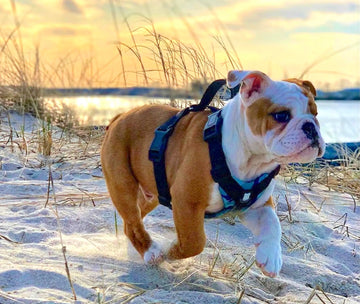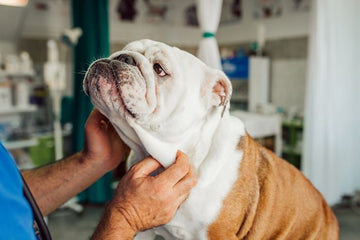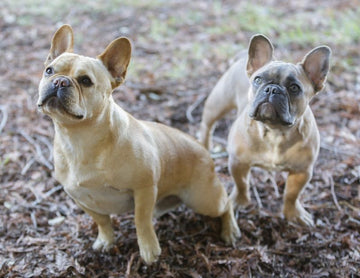As a devoted Bulldog owner, I’ve heard my fair share of tall tales and myths about our wrinkly-faced friends. Whether from the well-meaning neighbor, the random dog park visitor, or even my own late-night Google searches, it seems there’s no shortage of opinions on how to care for a Bulldog. Let’s have some fun as we bust a few of these Bulldog health myths and get down to what really matters for keeping our Bullies happy and healthy.
Myth #1: Bulldogs Can't and Don't Like Exercise
When I first brought my first Bulldog home nearly 20 years ago, I was a bit nervous about how much exercise she could handle. I’d heard from a friend of a friend that Bulldogs are basically couch potatoes with paws, destined to spend their days snoring away on the couch. Well, let me tell you, that myth was quickly busted the first time my Bulldog got the “zoomies” around the living room, knocking over a lamp in the process!
Daisy is on the move!
Reality Check: Bulldogs aren’t marathon runners, but they absolutely need and enjoy exercise. Short, daily walks are perfect, and interactive playtime with toys can help keep their minds and bodies active. Just remember, their short snouts mean they can overheat easily, so take it easy on hot days and keep walks to the cooler parts of the morning or evening. Also, watch for signs of overexertion, like heavy panting or drooling, and always have plenty of fresh water on hand.
Myth #2: All Bulldogs Have Breathing Problems
You’ve probably heard the stereotype that all Bulldogs always sound like they’ve just finished a marathon on a steep mountain. It’s true that Bulldogs are brachycephalic—a fancy term for “short-nosed”—which can sometimes lead to breathing challenges. But here’s the thing: not every Bulldog is doomed to gasp for air. Take my friend Blue, for example—a lively English Bulldog who defied the odds. Blue didn’t snore much and had no noticeable breathing issues. In fact, she loved running along the beach and could keep pace with larger breeds for quite a while. Every Bulldog is unique, and several factors—like overall health, genetics, and climate—play a significant role in whether they might experience breathing problems.
Blue is a serious athlete, but still 100% all English Bulldog
Reality Check: While some Bulldogs do have respiratory issues, many lead normal, healthy lives. One main key is weight management. Keeping your Bulldog at a healthy weight reduces pressure on their airways. It’s also important to avoid extreme heat and humidity, as these conditions can exacerbate breathing problems. Regular check-ups with a vet familiar with Bulldogs can help catch any issues early on. If your Bulldog does struggle with breathing, your vet may be able to offer solutions to alleviate severe cases.
Myth #3: Bulldogs Are Prone to Being Overweight
When I first noticed my Bulldog getting a bit rounder around the edges, I panicked. I’d read that Bulldogs are naturally predisposed to obesity, and I started imagining all sorts of health problems. But then I realized that, like people, Bulldogs can keep a healthy weight with the right lifestyle—although they may give you those irresistible puppy eyes for an extra treat! Bulldogs are just built different, and many strangers and onlookers assume a Bulldog is overweight because he/she is wider and more muscular than their skinny little poodle.
Titan is a beauty!
Reality Check: Bulldogs can gain weight easily due to their slower metabolism, but this doesn’t mean they’re doomed to be chubby. Portion control is crucial, as is feeding them a high-quality, breed-appropriate diet. My vet recommended measuring out my Bulldog’s food and avoiding free-feeding (where food is available all day). Incorporating some low-impact exercises, like gentle tug-of-war or puzzle feeders that make them work for their food, can help burn off those extra calories. And let’s be honest, keeping your Bulldog fit is also a good excuse for some fun bonding time!
(Here is the food we have use for all of our Bulldogs. It's not only very high quality, it's pretty affordable compared to other well-known brands. Please look at the ingredients closely and notice the fruits, veggies, and vitamins. We use the fish-based formula, as many Bulldogs have poultry allergies.)
Myth #4: Bulldogs Are Naturally Lazy
There’s a common misconception that Bulldogs are just lazy lumps who’d rather sleep all day than do anything remotely active. I’ve lost count of how many times people have said, “Oh, Bulldogs are so lazy, right?” Well, my Bulldog didn’t get that memo. She’s all about short bursts of activity—especially if there’s a squeaky toy or ball involved!
Reality Check: Bulldogs do enjoy their naps, but they also have bursts of energy, especially when they’re young. Regular playtime is essential to keep them mentally and physically stimulated. Bulldogs can be stubborn, so making playtime fun and engaging with their favorite toys can encourage them to be more active. Think of it as playing fetch on their terms—short and sweet! And remember, after all that play, they’ll probably be ready to snuggle up for a good nap, so it’s a win-win for everyone.
(When you Bulldog is ready to be lazy, they should have a comfortable and safe place to do so. Here are the beds we use, that our Bulldog just love. They provide a lot of support so they don't wake up stiff, the cover is easily washable, and they have lasted for a pretty long time, so far. We order the 41" or 44" options, as our Bulldog love to stretch out!)
Myth #5: Bulldogs Don’t Need Regular Grooming
When I first got my Bulldog, I thought, “Short hair? Low maintenance, right?” Well, I couldn’t have been more wrong! While Bulldogs may have short coats, they are prone to excessive shedding and definitely need regular brushing, especially with a brush that can reach the undercoat. But it’s not just their coats that need attention—those cute wrinkles require some serious TLC as well. I quickly learned that neglecting to clean between those folds can lead to nasty skin infections—something I found out the hard way after an unplanned trip to the vet.
A good Bulldog brush will remove the undercoat without harming the top-coat or skin
Reality Check: Bulldogs require regular grooming to stay healthy and comfortable. Start with brushing: Bulldogs shed more than you might expect, so using a brush that can get through to the undercoat is key to keeping their shedding under control. Then, there’s the wrinkle care. Moisture and debris can get trapped in their folds, leading to skin infections like dermatitis. I recommend using a gentle, dog-safe wipe to clean their wrinkles every day, especially after meals. And be sure to dry those folds thoroughly—dampness can cause irritation and infections.
Regular ear cleaning, nail trimming, and the occasional bath are also crucial parts of a Bulldog’s grooming routine. By keeping up with these grooming tasks, you’ll ensure that your Bulldog looks great, feels comfortable, and stays healthy.
(Here is the brush we use, that works wonders on keeping her seasonal shedding under control. We use the medium short-hair model and you'll be AMAZED at how much hair will safely come off your Bulldog. We have used the same one for over 10 years, so they are well made and built to last, justifying their higher price.)
What You Should Be Concerned About
While debunking myths is important, it's equally crucial to focus on the real health concerns that can affect Bulldogs. Rather than hip dysplasia, Bulldogs are more likely to face issues like elbow dysplasia and patellar luxation because of their build and gait. Keeping your Bulldog at a healthy weight and providing joint supplements, as recommended by your vet, can help mitigate these risks. Regular vet check-ups are essential to monitor for these conditions, as well as other common Bulldog health concerns like heart disease, breathing issues, and skin allergies. By focusing on these areas, you can ensure that your Bulldog stays as healthy and happy as possible.
Happy and Healthy Ellie!
Understanding your Bulldog’s unique needs—and not getting caught up in myths—will help you provide the best care possible. Every Bulldog is different, and what works for one might not work for another, so stay informed, stay engaged, and most importantly, enjoy every goofy, wonderful moment with your Bulldog!
We hope you picked up something useful about caring for your Bulldog today.
If you’d like to learn more about Bulldogs, please visit The Bulldog Blog, presented by Bulldog Grade.
###
#####
This blog contains affiliate links, providing us a commission if you decide to make a purchase through our links, at no cost to you. We will use any revenue to help bring our products back to market, as soon as possible.









